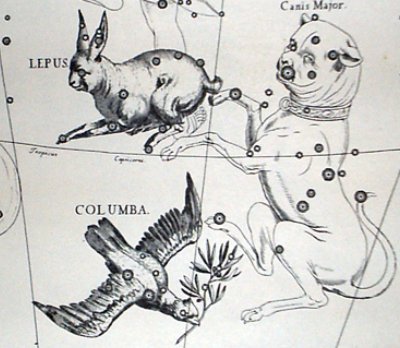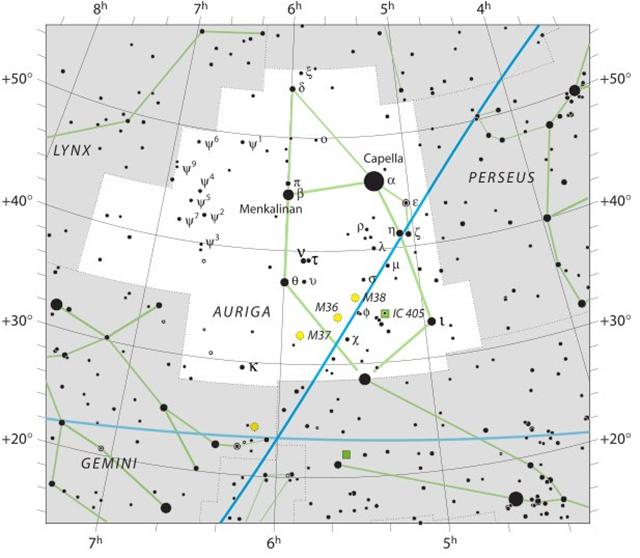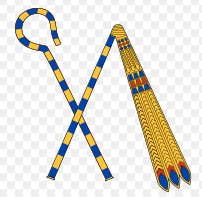Bb9.1
In the Babylonian zodiac we can perceive a suggestion of a
broken staff in the left hand of Orion (True Shepherd of
Anu);
with its top end then continued in the right hand of Auriga
in form of his Crook. In between flows the Milky Way,
in the gap between Taurus (Bull of Heaven) and Gemini
(Great Twins).
Ka. Particle of the affirmative imperative, of
cardinal numerals, of independent ordinal numerals, and of
emphatic exclamation, e.g. ka-maitaki! how nice!
Vanaga. Ká. 1. To light a fire in order to cook in
the earth oven (see umu): he-ká i te umu, he-ká i
te kai. 2. Figuratively: to fire up the soul. To put
oneself in a fury (with manava): ku-ká-á toona
manava he has become furious. Vanaga. 1. Of T. 2.
Imperative sign; ka oho, ka tere, ka ea,
begone!; ka ko iha, a greeting T; ka mou,
hush; ka oho, goodbye. 3. Infinitive sign; mea
meitaki ka rava, a thing good to take; ka harai kia
mea, to accompany. 4. A prefix which forms ordinals from
cardinals. 5. The dawning of the day. 6. Different (? ke).
Churchill.
 |
 |
 |
|
Bb8-37 (321) |
Bb8-38
→ 83 * 8 =
664 |
Bb8-39 |
|
mai tae topa te Raa |
ki to ua |
ai ka topa te Raa |
|
μ Columbae (86.1),
Saiph (86.5), ζ μ
Columbae,
SAIPH (Sword) = κ
Orionis
(86.5), τ Aurigae, ζ
Leporis (86.6) |
υ Aurigae (87.1), ν
Aurigae (87.2),
WEZN (Weight) = β
Columbae,
δ Leporis (87.7),
TZE (Son) = λ
Columbae
(87.9) |
Ardra-6 (The Moist
One) /
ANA-VARU-8 (Pillar
to sit by)
χ¹
Orionis,
ξ
Aurigae (88.1),
BETELGEUZE =
α
Orionis
(88.3),
ξ
Columbae (88.5),
σ
Columbae (88.7)
ZUBEN ELGENUBI (α
Librae) |
|
Topa. 1.
To bend down, to
drop to the ground;
to fall on a certain
date. 2. To stop
doing something, to
drop; ina ekó
topa taau aga,
do not stop, keep
doing your work. 3.
To remain, to be
left over, to be
unfinished; he
topa te kai, the
food is not
finished, there is
some left. 4. To
come to one's
memory; i te aamu
he topa te vânaga
tûai, in the
legends old words
come to memory. 5.
To remember, to
reflect (with
mana'u as
subject); e-topa
rivariva tokorua
mana'u ki te me'e
nei, let the two
of you think
carefully about this
thing. Vanaga. 1.
Wine; topa tahaga,
id. 2. To fall in
drops, to descend,
to go down, to
abdicate; topa
iho, to fall;
hakatopa, to
knock down, to cause
to fall; hakatopa
ki raro, to
knock down, to
subjugate. 3.
Childbirth,
abortion; topa te
poki, to lie in.
4. A feast, to
feast. 5. To arrive,
to result; topa
rae, newcome;
topa iho, to
come unexpectedly;
topa ke, to
deviate; topa no
mai, topa
hakanaa, topa
tahaga, mau
topa pu,
unexpected; topa
okotahi,
solitary;
hakatotopa, to
excite, to foment.
6. Bad, low, cheap,
failure; igoa
topa, nickname;
ariga topa,
sinister, sly,
ill-tempered, to
hang the head;
hakatopa, to
disparage;
hakatotopa,
irresolute. 7. (Of
upward movement)
topa ki raro, to
scale, to surpass;
hakatopa ki te ao,
to confer a dignity;
hakatopa ki te
kahu, to spread
a sail;
hakatotopa, to
make a genealogy.
Churchill.

Raa.
Sun; day; i te
raá nei, today;
raá îka, good
day for fishing.
Vanaga. 1. Sun. 2.
Day. 3. Time. 4.
Name of sub-tribe.
Fischer.
Te manu i te raá
= comet.
Barthel.
'... The
substitution of the
sun for the sail,
both of which are
called ra or
raa in
Polynesia, is a
remarkable feature
in Easter Island art
... ' Heyerdahl 3.
1. The sun;
raa ea mai,
raa puneki,
sunrise;
raa tini,
raa toa,
noon. P Mgv., Ta.:
ra,
the sun. Mq.:
a, id.
2. Day, date;
a raa nei a,
to-day, now;
raa i mua,
day before. P Mgv.,
Ta.:
ra, a
day. Mq.:
a, id.
Churchill.
'... The chief thus
makes his appearance
at Lakeba
from the sea, as a
stranger to the
land. Disembarking
at the capital
village of Tubou,
he is led first to
the chiefly house (vale
levu) and next
day to the central
ceremonial ground (raaraa)
of the island ...'
(Islands of History)
Ta.:
toraaraa,
to raise up.
Churchill 2. |
 |
 |
 |
 |
|
Bb8-40 (324) |
Bb8-41 |
Bb8-42 |
|
i
te hokohuki - ka hua
ia |
mai tae atu ki te
tagata - hupee
hia |
ka tuu i te toga |
|
η
Leporis (89.0),
PRAJA-PĀTI (Lord of
Created Beings) =
δ
Aurigae,
MENKALINAN (Shoulder
of the Rein-holder)
=
β
Aurigae, MAHASHIM
(Wrist) =
θ
Aurigae,
and
γ
Columbae (89.3),
π
Aurigae (89.4),
η
Columbae (89.7)
*48.0 = *89.4 -
*41.4 |
μ Orionis (90.3), χ²
Orionis (90.5) |
6h (91.3)
ν
Orionis (91.4),
θ
Columbae (91.5),
π
Columbae (91.6)
*50.0 = *91.4 -
*41.4 |
|
Hoko. 1. To
jump; to rock
or swing in
rhythm with the
chants in festivals,
as was the ancient
custom; an ancient
dance. He to'o mai e te hoa manu i te mamari ki toona rima, he ma'u,
he hoko, the
'bird master'
receives the egg in
his hand and carries
it, dancing. 2.
Number prefix: 'in a
group of...':
hokotahi,
alone; hokorua, in a group of two (also companion, e
hakarere te kai mo
toou hokorua,
leave some food for
my companion);
hakatoru, in a
group of three,
etc.; hokohía,
in a group of how
many? Hokohía ana
oho koe ki te rano?
With how many people
will you go to the
volcano? Vanaga. 1.
To traffic, to
trade, to buy, to
ransom (hoò);
hoòa te kaiga,
to buy land. 2. To
sport, to play.
Churchill. Move the
body to and fro with
the rythm of a song.
Barthel.
Ka. Particle
of the affirmative
imperative, of
cardinal numerals,
of independent
ordinal numerals,
and of emphatic
exclamation, e.g.
ka-maitaki! how
nice! Vanaga. Ká.
1. To light a fire
in order to cook in
the earth oven (see
umu):
he-ká i te umu,
he-ká i te kai.
2. Figuratively: to
fire up the soul. To
put oneself in a
fury (with manava):
ku-ká-á toona manava
he has become
furious. Vanaga. 1.
Of T. 2. Imperative
sign; ka oho,
ka tere,
ka ea, begone!;
ka ko iha, a
greeting T; ka
mou, hush; ka
oho, goodbye. 3.
Infinitive sign;
mea meitaki ka rava,
a thing good to
take; ka harai
kia mea, to
accompany. 4. A
prefix which forms
ordinals from
cardinals. 5. The
dawning of the day.
6. Different (?
ke). Churchill.
Hupee.
Mucus; hupeehupee,
asthma. T Pau., Ta.:
hupe, mucus.
Churchill. Ta.:
Hupe, mucus.
(Sa.: isupē,
id.) Ma.:
hupe,
id. Churchill.
Rhume, air
froide. Jaussen
according to
Barthel. |
At π Aurigae (Bb8-40) we can perceive
a tiny break in the
tao part at left.
In the G text there is a tao also at the Sword of
Orion:
 |
 |
 |
 |
 |
|
Ga1-22 |
Ga1-23 |
Ga1-24 |
Ga1-25 |
Ga1-26 |
|
μ Columbae (86.1),
Saiph (86.5), ζ μ
Columbae,
SAIPH (Sword) = κ
Orionis
(86.5), τ Aurigae, ζ
Leporis (86.6) |
υ Aurigae (87.1), ν
Aurigae (87.2),
WEZN (Weight) = β
Columbae,
δ Leporis (87.7),
TZE (Son) = λ
Columbae
(87.9) |
Ardra-6 (The Moist
One) /
ANA-VARU-8 (Pillar
to sit by)
χ¹
Orionis,
ξ
Aurigae (88.1),
BETELGEUZE =
α
Orionis
(88.3),
ξ
Columbae (88.5),
σ
Columbae (88.7)
ZUBEN ELGENUBI (α
Librae) |
η
Leporis (89.0),
PRAJA-PĀTI (Lord of
Created Beings) =
δ
Aurigae,
MENKALINAN (Shoulder
of the Rein-holder)
=
β
Aurigae, MAHASHIM
(Wrist) =
θ
Aurigae,
and
γ
Columbae (89.3),
π
Aurigae (89.4),
η
Columbae (89.7)
*48.0 = *89.4 -
*41.4 |
μ Orionis (90.3), χ²
Orionis (90.5) |
The central glyph at heliacal Betelgeuze together with the culmination of
Zuben Elgenubi (at 21h) can be compared with the glyph 33
days earlier in the B text:
|
Ariki glyphs serve in G to demarcate
distance from winter solstice, for
instance:
|

|











